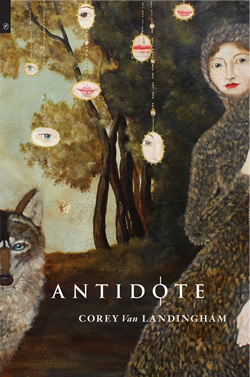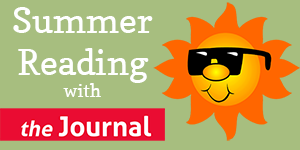Karin Gottshall lives in Vermont and teaches at Middlebury College. Her first book, Crocus, won the Poets Out Loud prize and was published by Fordham University Press in 2007. She is also the author of three chapbooks—Flood Letters (Argos Books), Almanac for the Sleepless (Dancing Girl Press), and Swans (Argos Books). Her poems have appeared in Blackbird, Crazyhorse, FIELD, The Gettysburg Review, and elsewhere.
Shelley Wong: Congratulations on winning! We are thrilled and very excited to bring this book into the world. What was the writing process like for this book and how did it compare with writing your first book, Crocus? How did the three-part structure come together?
Karin Gottshall: Thank you! I am so grateful for and humbled by this prize. The Wheeler Prize book is one I’m interested in every year, and I’m so proud that The River Won’t Hold You will be in this series. Kathy Fagan is a poet whose work and contributions I love and admire so much, so to have my manuscript selected by her means the world to me.
I hadn’t actually thought much about the way the experience of writing this book compared with that of Crocus. This may be a dull answer, but actually I think it was much the same. I work slowly, very slowly, and both books took many years to put together and both went through many drafts and many poems were overhauled and cut and replaced before I felt like the books had arrived at something like their final forms.
The three-part structure, which I used in Crocus too, came about without my having planned it. When I looked at the poems all together, and saw the ways different pieces seemed to talk to each other and build from each other, they just seemed to keep falling into three constellations. I tried working against that, since I didn’t want to feel like I was just arranging them that way out of habit, but no other formal solution I came up with seemed satisfying. I like the number three, or at least it seems to be a number that I often find my life organizing itself around in different ways. In terms of poetry I tend to use tercets quite frequently, and a reviewer noticed that a lot of poems in Crocus (unconsciously) favor the anapest. So there must be something about the formal qualities of three that feels natural to me in the way I create rhythm and structure.
SW:I admire these poems for their evocative images of a woman’s life from youth to maturity. How did you enter into this speaker’s (or speakers?) consciousness over a lifespan? What were your concerns?
KG: Honestly I don’t think I had any sense of entering another consciousness. Not that these speakers are all “me,” exactly, or that all of the experiences in the book are mine, but I guess, as I wrote these poems, I was more aware of going deeper into myself and my own questions than of trying to inhabit the consciousness of a persona.
I’ve had the experience of doing that, too—my chapbook, Flood Letters (Argos Books, 2011), is a narrative sequence spoken in the voice of a character who is definitely not me, though we certainly share a lot of the same preoccupations. In writing that way, one of my main concerns was making her world coherent to the reader without gunking it up with too much explanation. Conversely, a big concern for me in writing the kind of poems in The River Won’t Hold You is allowing enough of the solid world in to give the reader something for their brain to do as well as some sensual pleasure or frisson in the imagery—not relying too much on the too-easy shorthand of emotional language alone.
SW: The shifting spaces and landscapes are vividly rendered with precision and emotional color. How did the world (or worlds) come into being for this collection?
They came into being through the process of rendering down the raw material of decades of daydreams. I don’t mean to sound glib, by that—I really think my poems and their worlds emerge out of my fundamental affinity toward that pursuit and ineptitude for pretty much any other. I hope that doesn’t sound frivolous—I think reverie is necessary to human happiness, and certainly, in my experience, to art. And yet for some reason it feels like we’re supposed to be apologetic about it.
Jenna Kilic: I’m interested in how you arrived at the book title. Often times, a book will have an eponymous poem. Your book nearly has that in the poem with the running title, “After all, the river.” When I read “The River Child,” I feel like it could nearly be titled “The River Won’t Hold You” or come before a poem with that title. Can you explain how you arrived at the book’s title and how it works with and/or against the poems in the book?
KG: The manuscript went through several titles in different versions, and I liked all of them in different ways, but none of them felt exactly right. I think the title fell into place for me at just about the same moment that the manuscript as a whole did. I hope the feels concrete but also appropriately ambiguous—there are multiple possible meanings, and I think all of them are present in some way in the book.
JK: I’m interested in the rhyme schemes you use, particularly the internal and slant rhymes, and how, because they’re so well-managed and well-placed, they sneak up on you. It seems that poets either love rhyme or hate it. I love good rhymes and yours are certainly that. Can you tell us what draws you to rhyme and how you see it working in your poems?
KG: Thank you! I don’t usually consider my poems as having rhyme schemes unless I’m working with a received form, but perhaps they kind of do, in that I think I use patterns of sound in a similar way. I think of rhyme and sound effects like that as a kind of spelunking rope that I use to find my way through the poem. In striking a strong sound I think I often imagine that I’m also casting that sound out ahead of myself into the poem, and part of the poem’s work is then finding its way back—or catching up—to that repeated sound. So I guess that creates a kind of constraint, even in free verse poems, that works a little like the constraint of end-rhymes in verse, and I find that useful. Those schemes may not always stay intact in later versions of the poem, but they sometimes help me find my way through initial drafts, and often they become important structurally.
JK: I have a sense of other poets who might have influenced your poems, but would you mind explaining whose work you feel most influenced or inspired by or if you had a particular mentor who was a great influence on these poems?
KG: This is so hard to answer, because so many poets come immediately to mind but it always feels somehow presumptuous to me to claim them as influences. And influence always seems so wide-ranging to me—including novels and music and paintings and accidents of fate as well as poetry—so that just talking about poets seems to give a distorted picture. I can say that there are some poets that for a long time I have returned to over and over again for solace and pleasure, and they include Emily Dickinson, Lorine Niedecker, Elizabeth Bishop, Mary Ruefle, Robert Hass, Larry Levis, and Jack Gilbert. I know I am leaving out important names I will regret.
All of my wonderful mentors at Sarah Lawrence and Vermont College have been huge influences on my writing, and my own brilliant students at Interlochen and Middlebury have inspired me daily with their wild imaginations, their courage, and the urgency and importance of what they have to say through their writing.
SW & JK: Is there anything else you would like to add? Thanks so much for your time!
KG: No, nothing to add! Thank you for the lovely, thoughtful questions—it has been a pleasure.



